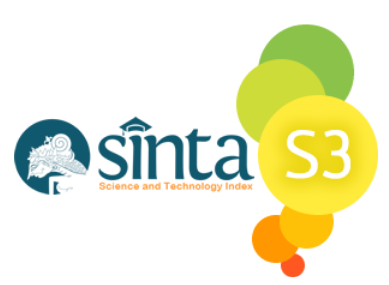WHAT IS THE YOUNG GENERATION INTENSION IN DOING TAX EDUCATION?
Abstract
The behavior of the young generation to be willing to carry out tax education through the tax volunteer program is classified as a useful activity in increasing tax compliance. The theory of planned behavior is one pattern that can be used to identify factors that influence a behavior, in this case is the behavior of conducting tax education through a tax volunteer program. The purpose of this study is to find empirical evidence about the influence of attitudinal factors, subjective norms, perceptions of controlling behavior and intention of the younger generation in this case students towards the behavior of conducting tax education through a tax volunteer program.
This type of research is descriptive research verification with a quantitative approach. This research was conducted on tax volunteers registered through the tax center of the UB Faculty of Administrative Sciences, as many as 80 people from. Sampling is done using Saturated sampling techniques, ie all populations are taken as a whole sample. Variables in the study included independent variables consisting of attitude (X1), social norms (Subjective Norm) (X2), and perceptions of behavioral control (X3) (X3). The intervening variable used is intense (Y). the dependent variable used is student behavior in conducting tax education through a tax volunteer (Z) program. The test used in testing the research instrument is validity and reliability testing. The stages of analysis used in this study are verification analysis including; Test path analysis (path analysis), coefficient of determination analysis, hypothesis testing using Statistical Package for Social Science (SPSS) software.
The results of this research are, known that Attitude (X1), and the perception of the ability to control (Perceived Behavioral Control) (X3) affect the behavior of young generation as a students in conducting tax education with a tax volunteer program (Z) through intention (Y) as an intermediate variable. Or in other words attitudes and perspectives controlling the behavior of a student affect their intentions / intentions in carrying out a behavior, which in this case is doing tax education with a tax volunteer program.
Keywords
Full Text:
PDFReferences
Ajzen, I. (1988). Attitudes, Personality, and Behavior. Milton-Keynes, England: Open University Press & Chicago, IL: Dorsey Press.
Ajzen, I. (1991). Theory of Planned Behavior. Organizational Behavior and Human Decision Processes, Volume 50, pp. 179-211.
Ajzen, I. (2005). Attitude personality and behavior (Second Edition). London: Open University Press.
Ajzen,I. (2006). Constructing a TpB Questionnaire: Conceptual and Methodological Considerations.
Anjani, Devira Nourma & Restuti, MI Mitha Dwi. (2016). Analisis Faktor-Faktor Kepatuhan Wajib Pajak Orang Pribadi Pelaku Usaha Pada KPP Pratama Salatiga. Surabaya : Jurnal Ilmiah Universitas Kristen Satya Wacana.
Arikunto, S. (2002). Prosedur Penelitian Suatu Pendekatan Praktek. Jakarta: PT Rineka Cipta.
Azwar, S. (1995). Sikap manusia: Teori dan pengukurannya. Yogyakarta: Pustaka Pelajar.
Direktorat Jendral Pajak. (2017). Pengelolaan Relawan Pajak. Jakarta: Kementerian Keuangan Republik Indonesia, http://edukasi.pajak.go.id/kegiatan/relawanpajak/165-pengelolaan-relawan-pajak.html.
Fishbein, M. dan Ajzen, I. (1975). Belief, Attitude, Intention, and Behavior: An Introduction to Theory and Research. Reading, Massachusetts: Addison- Wesley Publishing Company.
Fishbein, M. dan Ajzen, I. (1980). Understanding Attitudes and Predicting Social Behavior. Englewood Cliffs, NJ: Prentice-Hall.
Ghozali, Imam. (2006). Aplikasi Analisis Multivariate dengan Program SPSS. Semarang: Badan Penerbit Universitas Diponegoro.
Jogiyanto, (2007). Sistem Informasi Keperilakuan. Edisi Revisi. Yogyakarta: Andi Offset.
Mardiasmo. (2009). Perpajakan edisi revisi 2009. Yogyakarta : Penerbit Andi.
Mustikasari, Elia (2007). Kajian Empiris Tentang Kepatuhan Wajib Pajak Badan di Perusahaan Industri Pengolahan di Surabaya. Surabaya : Jurnal dan Prosiding SNA - Simposium Nasional Akuntansi Vol. 10.
Notoatmodjo, Soekidjo, (2003), Pengembangan Sumber Daya Manusia, Jakarta: PT. Rineka Cipta. Open University Press & Chicago, IL: Dorsey Press.
Nunnally, J. C., & Bernstein, I. H. (1994). Psychometric theory (3rd ed.). New York: McGraw-Hill.
Sugiyono. (2013). Metode Penelitian Pendidikan Pendekatan Kuantitatif, Kualitatif, dan R&D. Bandung: Alfabeta.
Suryani, Lilis (2017). Pengaruh Sikap, Norma Subjektif, Dan Kontrol Perilaku Persepsian Terhadap Kepatuhan Wajib Pajak Orang Pribadi di Daerah Istimewa Yogyakarta Dengan Niat Mematuhi Pajak Sebagai Variabel Pemoderasi. Yogyakarta : Skripsi Universitas Negeri Yogyakarta Vol. 5 No 3.
Taylor, S., & Todd, P. (1995). An integrated model of waste managient behavior: A test of household recycling and composting intentions. Environment and Behavior, 27, 603-630.
DOI: https://doi.org/10.18551/erudio.6-1.5
Refbacks
- There are currently no refbacks.
Copyright (c) 2019 Erudio Journal of Educational Innovation

This work is licensed under a Creative Commons Attribution 4.0 International License.












